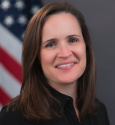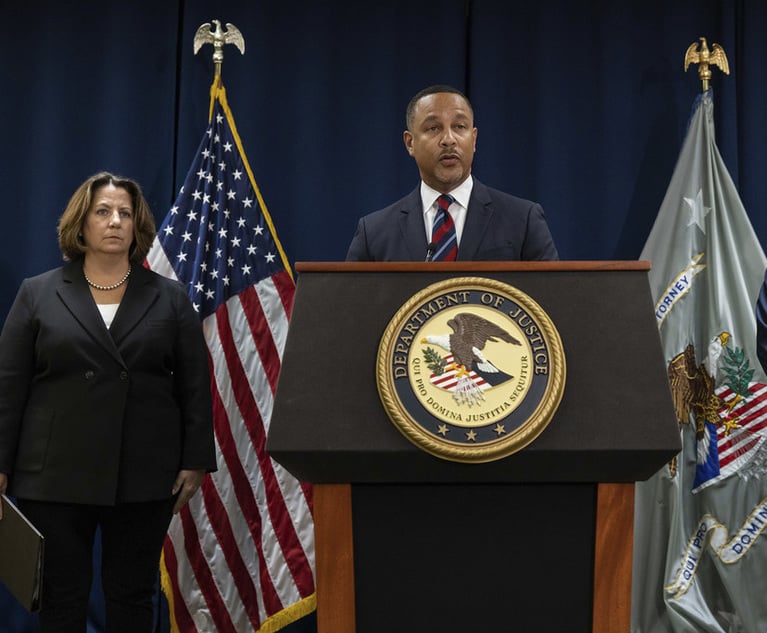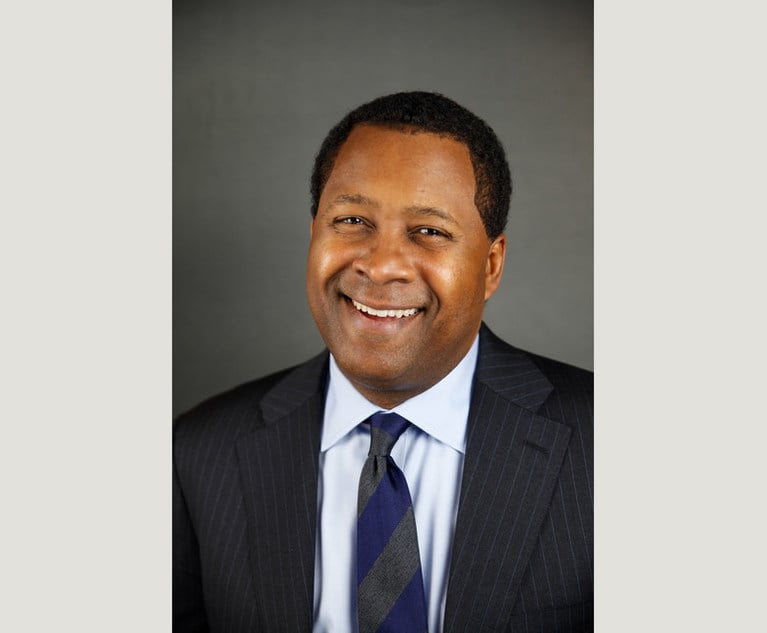Compliance Hot Spots: Coronavirus Compliance: Neil Barofsky's Advice, and Predictions | Pandemic-Era Insider Trading Alarms | Who Got the Work: Alice Fisher's Guiding Sen. Richard Burr | Headlines, Moves & More
Welcome to Compliance Hot Spots, and we hope you are safe and well. Jenner & Block's Neil Barofsky speaks with us about coronavirus compliance. Law firms are advising on insider-trading matters in the virus era. Scroll down for Who Got the Work, major headlines and more.
March 31, 2020 at 09:00 PM
12 minute read
Welcome to Compliance Hot Spots, our snapshot on white-collar, regulatory and compliance news and trends. Jenner & Block's Neil Barofsky speaks with me about coronavirus compliance. Law firms are advising on insider-trading matters in the virus era. Scroll down for Who Got the Work, major headlines and more.
We hope you, colleagues, family and friends are staying safe and healthy amid the coronavirus pandemic. Tips, feedback and thoughts on your practices are always appreciated. How are you coping with the covid-19 crisis? Contact C. Ryan Barber in Washington at [email protected] and at 202-828-0315. Follow @cryanbarber. Thanks for reading, and stay safe.

The Last 'Special Inspector General' on What Awaits Watchdog for Coronavirus Funds
In an election year overflowing with partisan animus, Congress came together last week to approve a roughly $2 trillion relief package to buoy workers and companies devastated by the coronavirus crisis.
It was a remarkable bill, creating the largest emergency spending program in the nation's history. But Congress was not entirely without a playbook. Indeed, for oversight of the billions of dollars in upcoming spending, lawmakers took a page out of the bill that bailed out banks during the 2008 financial crisis, creating a "special inspector general" to watch over the coronavirus stimulus funds.
Neil Barofsky (above), the special inspector general appointed under the Troubled Asset Relief Program, or TARP, recounted his experience overseeing the bailout funds in a recent conversation with me. Now a partner at Jenner & Block, Barofsky addressed the challenges awaiting whomever is appointed the special inspector general for the pandemic response. Here are some highlights from our discussion, which has been edited for length and clarity.
>>> "Here, the potential number of companies or recipients is vast, to put it mildly, which makes certain things more important and certain things very different. It's going to be extraordinarily important what processes and procedures surround the determination of who gets money and who doesn't. The mechanics of this are going to be so vast and so huge that, from an oversight perspective, it's a very different process. We could look at every bank application if we wanted to. There's no way an oversight entity is going to be able to look at every loan. It will be one that will be more process-oriented than individual institution-oriented. The inspector general and [congressional] oversight panel is going to have to spend a lot of time on the process—to make sure it's fair, to limit the opportunities for abuse."
>>> "Law firms are going to have to help companies make their applications, they're going to have to help them make sure their compliance function is up to snuff to deal with whatever requirements are going to be pushed out. No company is going to want to take money from the government and later be found out to not be in compliance with the terms the government sets for that bailout. That would be a public relations disaster."
>>> "The skills of being a special inspector general or a partner at a law firm are not easily transferred to homeschooling children. I like to think that I treat my associates with great respect and deference. But you cannot treat a second-grader like an associate, I can assure you, when you're trying to homeschool them. This is no fun at all. It is more stressful than my job ever is. I yearn to be a special inspector general, living in the basement of the Treasury Department, sitting over open sewage, unable to find a garbage can, than to try to go through writing and math with my second-grader."
More reading here at The Washington Post: Trump takes immediate step to try to curb new inspector general's autonomy, as battle over stimulus oversight begins.

Who Got the Work
>> Alice Fisher (above) of Latham & Watkins is advising U.S. Sen. Richard Burr, R-North Carolina, amid a federal regulatory inquiry of stock sales he made after receiving a closed-door COVID-19 briefing, according to a CNN report. Fisher, a former George W. Bush-era lead U.S. Justice Department lawyer, said in a statement that Burr "welcomes a thorough review of the facts in this matter, which will establish that his actions were appropriate." The statement also said: "The law is clear that any American—including a Senator—may participate in the stock market based on public information, as Senator Burr did." The Washington Post has more here. Burr separately faces a civil suit in Washington's federal trial court filed by an investor.
>> Kelley Drye & Warren partner Christie Grymes Thompson, who leads the firm's advertising and marketing and consumer product safety practice, represented Williams-Sonoma Inc. in a new settlement with the Federal Trade Commission over "Made in USA" claims. "Many of us want to buy products that are made in the USA, and we trust companies like Williams-Sonoma to tell us the truth," Andrew Smith, director of the FTC's bureau of consumer protection, said in a statement. "When a company falls short, we will hold it accountable." The retailer neither admitted nor denied the claims. Read the complaint here.
>> In a U.S. Justice Department antitrust review, Shawn Johnson of Crowell & Moring represented United Technologies Corp. and David Higbee and Benjamin Gris of Shearman & Sterling counseled Raytheon Company. DOJ said last week it was requiring UTC and Raytheon "to divest Raytheon's military airborne radios business and UTC's military global positioning systems and large space-based optical systems businesses in order to proceed with their proposed merger."
>> The law firms Buckley LLP and Fox Rothschild are advising clients in a new SEC enforcement action involving allegations of an unregistered penny stock dealer. The complaint was filed in Miami.

The Virus Pandemic and Insider Trading
There's a flood of reporting and advisories warning of the risks of insider trading amid the pandemic.
"The volatility in securities markets and the crisis atmosphere might lead to riskier behavior by insiders, particularly as more people have access to confidential information, with some of them being less accustomed to having access to and properly handling" material nonpublic information, or MNPI, lawyers at Cleary Gottlieb Steen & Hamilton recently wrote. The advisory stated "companies should consider the following in being "mindful" of their existing controls and procedures to safeguard MNPI and protect against insider trading."
Reuters has a new piece online titled "U.S. corporate crisis bailouts may prove bonanza for insider trading, new study warns." The report spotlights research from the University of Pennsylvania's Wharton School, Stanford University, University of Cambridge and IESE Business School.
"Anytime the government picks winner and losers, there is a greater opportunity for insider trading by connected individuals," Daniel Taylor, a Wharton professor, told Reuters.
 Much of the guidance points to a statement from the SEC's enforcement leaders, Stephanie Avakian (at left) and Steven Peikin: "In these dynamic circumstances, corporate insiders are regularly learning new material nonpublic information that may hold an even greater value than under normal circumstances. This may particularly be the case if earnings reports or required SEC disclosure filings are delayed due to COVID-19. Given these unique circumstances, a greater number of people may have access to material nonpublic information than in less challenging times. Those with such access—including, for example, directors, officers, employees, and consultants and other outside professionals—should be mindful of their obligations to keep this information confidential and to comply with the prohibitions on illegal securities trading."
Much of the guidance points to a statement from the SEC's enforcement leaders, Stephanie Avakian (at left) and Steven Peikin: "In these dynamic circumstances, corporate insiders are regularly learning new material nonpublic information that may hold an even greater value than under normal circumstances. This may particularly be the case if earnings reports or required SEC disclosure filings are delayed due to COVID-19. Given these unique circumstances, a greater number of people may have access to material nonpublic information than in less challenging times. Those with such access—including, for example, directors, officers, employees, and consultants and other outside professionals—should be mindful of their obligations to keep this information confidential and to comply with the prohibitions on illegal securities trading."
Lawyers from Wachtell, Lipton, Rosen & Katz said in an advisory: "In the complex, rapidly changing and stressful environment in which we are now all operating, and with so many people working in unaccustomed settings, there is a heightened risk that even well-managed companies may experience lapses in the enforcement of well-established policies and procedures. Brief periodic reminders to employees may go a long way toward preventing a problem from arising."

Compliance Corner: What We're Reading
Pentagon Watchdog Tapped to Lead Committee Overseeing $2 Trillion Coronavirus Package. "The nation's top government watchdogs on Monday appointed Glenn Fine (above), the acting inspector general for the Pentagon, to lead the newly created committee that oversees implementation of the $2 trillion coronavirus relief bill signed by President Donald Trump last week. Fine will lead a panel of fellow inspectors general, dubbed the Pandemic Response Accountability Committee, and command an $80 million budget meant to 'promote transparency and support oversight' of the massive disaster response legislation." [Politico]
The Race for Virus Money Is On. Lobbyists Are Standing By. "Across the country, companies see a chance to cash in, do some good for the country or both, making virus outbreak response one of the few thriving sectors of the economy. And because so much of the business runs through Washington, the rush has created new opportunities for those who can offer access, influence and expertise in navigating bureaucratic hurdles and securing chunks of the relief package Mr. Trump signed into law on Friday. The boomlet has left the federal agencies responsible for regulating cleaning supplies, medical devices and medicines working overtime on requests to certify products for use in coronavirus response—and to clamp down on fraud. [NYT]
 3M's Legal Chief Keeps Five Things in Mind Amid Coronavirus Crisis. "3M General Counsel Ivan Fong (at left) knows a thing or two about disaster response as the former top lawyer at the Department of Homeland Security." His five tips: Setting priorities. Business continuity. Corporate governance. Over-communicate. And stay fit and rested. On priorities: "For us it's protecting our people and those affected by this global pandemic, particularly our front-line health care professionals. That means doing all we can to ramp up production and rapidly increase capacity for critical supplies needed to help protect their lives as they treat others." [Bloomberg Law]
3M's Legal Chief Keeps Five Things in Mind Amid Coronavirus Crisis. "3M General Counsel Ivan Fong (at left) knows a thing or two about disaster response as the former top lawyer at the Department of Homeland Security." His five tips: Setting priorities. Business continuity. Corporate governance. Over-communicate. And stay fit and rested. On priorities: "For us it's protecting our people and those affected by this global pandemic, particularly our front-line health care professionals. That means doing all we can to ramp up production and rapidly increase capacity for critical supplies needed to help protect their lives as they treat others." [Bloomberg Law]
Walmart Was Almost Charged Criminally Over Opioids. Trump Appointees Killed the Indictment. "Even as company pharmacists protested, Walmart kept filling suspicious prescriptions, stoking the country's opioid epidemic. A Republican U.S. Attorney in Texas thought the evidence was damning. Trump's political appointees? Not so much." [ProPublica]
I Helped Write the STOCK Act. It Didn't Go Far Enough. "While it is not clear whether these senators violated that law, it is clear this episode has undermined the public's trust in our elected officials. And it raises an important question: Should members of Congress even be permitted to trade securities or engage in significant outside business activities at all? I don't think they should," Tyler Gellasch writes. [Politico]
Why Silicon Valley's Virus-Era D.C. Glow May Not Last. "Big tech companies like Google, Facebook and Amazon are enjoying an unexpected boost in their D.C. popularity after the White House enlisted them to use their tremendous size, reach and mastery of data to fight the coronavirus. But those same traits continue to pose a peril for Silicon Valley's giants, who are the subjects of multiple federal antitrust probes that are nearing a critical stage despite the pandemic." [Politico]
E.P.A., Citing Coronavirus, Drastically Relaxes Rules for Polluters. "The Environmental Protection Agency on Thursday announced a sweeping relaxation of environmental rules in response to the coronavirus pandemic, allowing power plants, factories and other facilities to determine for themselves if they are able to meet legal requirements on reporting air and water pollution. The move comes amid an influx of requests from businesses for a relaxation of regulations as they face layoffs, personnel restrictions and other problems related to the coronavirus outbreak." [NYT]
Amazon Presses on With Cloud Lawsuit Despite Pentagon's Walk-Back. "Amazon is fighting the Pentagon's decision to reconsider an important military technology contract award that went to Microsoft in October, arguing that the Defense Department is trying to "reaffirm" its earlier decision while ignoring other mistakes it allegedly made." [The Washington Post]
DOJ, FTC Bend Antitrust Rules to Let Companies Collaborate on Fighting COVID-19. With two key U.S. antitrust agencies offering their blessing, a group of at least 19 organizations have agreed to form an unprecedented coalition to meet the challenges wrought by the coronavirus. The COVID-19 Healthcare Coalition includes big tech companies like Microsoft Corp. and Amazon Web Services, health care companies like the Mayo Clinic and HCA Healthcare, electronic medical record companies, universities and others who are coordinating U.S. pandemic response efforts using data and analytics. [Law.com]

Notable Moves & More
>> Allen & Overy is adding two federal enforcement partners from Orrick Herrington & Sutcliffe in Washington, as the Magic Circle firm continues to pursue growth in the U.S. after ceasing merger discussions with O'Melveny & Myers. U.S. senior partner Tim House said the hires of Billy Jacobson and Jonathan Lopez, both veterans of the fraud section of the U.S. Department of Justice, reflect a reorientation in the locus of enforcement work, my colleague Dan Packel reports.
>> Hogan Lovells said Kelly Ann Shaw, a former leading trade and economic adviser to President Trump, is joining the firm as a partner in the international trade and investment practice. Shaw also will be a member of the firm's government relations and public affairs practice. My colleague Samantha Stokes has more here.
>> Holland & Knight said Barbara Martinez has joined the firm in Miami as a global compliance and investigations senior consultant. Martinez had spent nearly 20 years at the U.S. attorney's office in the Southern District of Florida.
>> Axinn said Craig Minerva has joined the firm's antitrust group in Washington as counsel. Minerva formerly was an antitrust lawyer at the U.S. Justice Department. The firm said last week that it had brought on Koren Wong-Ervin as an antitrust partner in Washington. She joins from Qualcomm Incorporated.
This content has been archived. It is available through our partners, LexisNexis® and Bloomberg Law.
To view this content, please continue to their sites.
Not a Lexis Subscriber?
Subscribe Now
Not a Bloomberg Law Subscriber?
Subscribe Now
NOT FOR REPRINT
© 2025 ALM Global, LLC, All Rights Reserved. Request academic re-use from www.copyright.com. All other uses, submit a request to [email protected]. For more information visit Asset & Logo Licensing.
You Might Like
View All
Compliance Hot Spots: GOP Eyes ESG as an Antitrust Issue + Another DOJ Crypto Seizure + Sidley Partner Jumps to Main Justice
9 minute read
Compliance Hot Spots: Lessons from Lafarge + Fraud Section Chief Talks Compliance + Cravath Lands FTC Commissioner
11 minute readLaw Firms Mentioned
Trending Stories
- 1Varsity Brands Lures Aboard Keurig Dr. Pepper Legal Chief
- 2Federal Judge Warns of 'Serious Sanctions' on FDIC Over Document Retention
- 3Meet the Former NFL Player Now Back at Vinson & Elkins
- 4Inside Track: Cooley's Modest Proposal to Make Executives Safer
- 5Justified Termination Does Not Bar Associate Attorney From Unemployment Benefits, State Appellate Court Rules
Who Got The Work
J. Brugh Lower of Gibbons has entered an appearance for industrial equipment supplier Devco Corporation in a pending trademark infringement lawsuit. The suit, accusing the defendant of selling knock-off Graco products, was filed Dec. 18 in New Jersey District Court by Rivkin Radler on behalf of Graco Inc. and Graco Minnesota. The case, assigned to U.S. District Judge Zahid N. Quraishi, is 3:24-cv-11294, Graco Inc. et al v. Devco Corporation.
Who Got The Work
Rebecca Maller-Stein and Kent A. Yalowitz of Arnold & Porter Kaye Scholer have entered their appearances for Hanaco Venture Capital and its executives, Lior Prosor and David Frankel, in a pending securities lawsuit. The action, filed on Dec. 24 in New York Southern District Court by Zell, Aron & Co. on behalf of Goldeneye Advisors, accuses the defendants of negligently and fraudulently managing the plaintiff's $1 million investment. The case, assigned to U.S. District Judge Vernon S. Broderick, is 1:24-cv-09918, Goldeneye Advisors, LLC v. Hanaco Venture Capital, Ltd. et al.
Who Got The Work
Attorneys from A&O Shearman has stepped in as defense counsel for Toronto-Dominion Bank and other defendants in a pending securities class action. The suit, filed Dec. 11 in New York Southern District Court by Bleichmar Fonti & Auld, accuses the defendants of concealing the bank's 'pervasive' deficiencies in regards to its compliance with the Bank Secrecy Act and the quality of its anti-money laundering controls. The case, assigned to U.S. District Judge Arun Subramanian, is 1:24-cv-09445, Gonzalez v. The Toronto-Dominion Bank et al.
Who Got The Work
Crown Castle International, a Pennsylvania company providing shared communications infrastructure, has turned to Luke D. Wolf of Gordon Rees Scully Mansukhani to fend off a pending breach-of-contract lawsuit. The court action, filed Nov. 25 in Michigan Eastern District Court by Hooper Hathaway PC on behalf of The Town Residences LLC, accuses Crown Castle of failing to transfer approximately $30,000 in utility payments from T-Mobile in breach of a roof-top lease and assignment agreement. The case, assigned to U.S. District Judge Susan K. Declercq, is 2:24-cv-13131, The Town Residences LLC v. T-Mobile US, Inc. et al.
Who Got The Work
Wilfred P. Coronato and Daniel M. Schwartz of McCarter & English have stepped in as defense counsel to Electrolux Home Products Inc. in a pending product liability lawsuit. The court action, filed Nov. 26 in New York Eastern District Court by Poulos Lopiccolo PC and Nagel Rice LLP on behalf of David Stern, alleges that the defendant's refrigerators’ drawers and shelving repeatedly break and fall apart within months after purchase. The case, assigned to U.S. District Judge Joan M. Azrack, is 2:24-cv-08204, Stern v. Electrolux Home Products, Inc.
Featured Firms
Law Offices of Gary Martin Hays & Associates, P.C.
(470) 294-1674
Law Offices of Mark E. Salomone
(857) 444-6468
Smith & Hassler
(713) 739-1250










